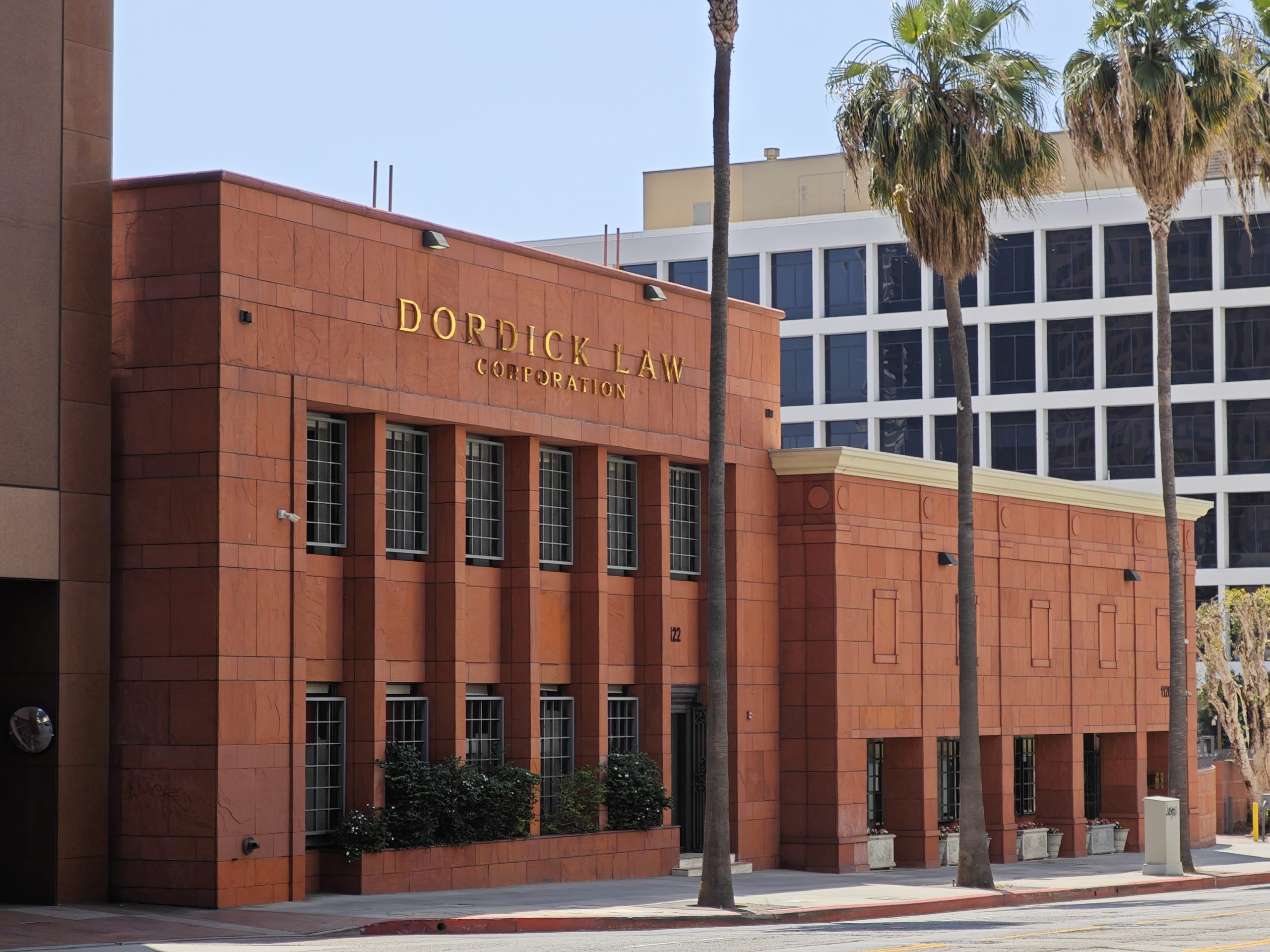Workplace sexual harassment creates a hostile, demeaming environment that affects your career, health, and well-being. If you experience unwanted sexual advances, requests for sexual favors, or sexually derogatory comments at work, you have legal rights under California law. Dordick Law Corporation represents employees throughout Southern California who face sexual harassment. Our sexual harassment lawyers in Southern California handles your case on a contingency basis—you pay nothing unless we recover compensation for you. Contact Dordick Law Corporation today for a free consultation.
What Constitutes Sexual Harassment in the Workplace
California law prohibits sexual harassment in the workplace under the Fair Employment and Housing Act (FEHA). Sexual harassment includes unwelcome conduct of a sexual nature that affects employment decisions or creates an intimidating, hostile, or offensive work environment.
The law recognizes three primary forms of sexual harassment:
- Quid Pro Quo Harassment occurs when a supervisor or manager conditions employment benefits on sexual favors. These benefits include hiring, promotion, raises, or continued employment. This form of harassment creates an explicit power dynamic. Rejecting sexual advances results in adverse employment consequences. Under California Government Code Section 12940(j)(1), employers bear strict liability for quid pro quo harassment by supervisors, regardless of whether the employer knew about the conduct. This is distinct from hostile work environment harassment, which has different legal standards.
- Hostile Work Environment Harassment happens when coworkers or supervisors engage in pervasive, unwelcome sexual conduct. This conduct interferes with your work performance or creates an intimidating, offensive atmosphere. It includes repeated sexual comments, jokes, touching, or displays of sexual material that a reasonable person would find offensive. California courts apply a totality-of-circumstances test to determine whether conduct creates a hostile work environment. They consider the frequency, severity, and nature of the unwelcome conduct. If you’re experiencing this type of harassment, Dordick Law Corporation‘s attorneys can evaluate your claim.
- Retaliation occurs when your employer punishes you for reporting sexual harassment. This also includes filing a complaint with the California Civil Rights Department (CRD, formerly DFEH) or participating in an investigation. Retaliation is illegal even if the original harassment claim is ultimately unproven. Protected activities include internal complaints, CRD filings, EEOC filings, and participation in workplace investigations. If you face retaliation, Dordick Law Corporation help you pursue additional claims and recover damages for wrongful termination.
Why You Need an Experienced Sexual Harassment Attorney
Sexual harassment cases involve complex employment law, evidence gathering, and negotiation with employers and their insurance carriers. An experienced attorney protects your rights and maximizes your compensation. The EEOC provides guidance on what constitutes illegal harassment and employer responsibilities.
Dordick Law Corporation brings substantial experience handling sexual harassment claims throughout Southern California. We understand the emotional toll harassment creates and the courage required to come forward. We handle your case with confidentiality and respect. Our firm works on a contingency fee basis, meaning you pay nothing upfront and we collect our fee only if we recover compensation for you. Your initial consultation is free and confidential. Learn more about Dordick Law Corporation‘s approach to employment law cases and our track record of case results. Our attorneys have recovered millions for clients facing workplace discrimination and harassment.
How Dordick Law Corporation Handles Sexual Harassment Cases
Our approach to sexual harassment representation includes thorough case evaluation, strategic investigation, and aggressive advocacy on your behalf.
- Case Evaluation: We begin by listening to your experience and gathering details about the harassment, your reporting efforts, and your employer’s response. We evaluate the strength of your claim under California FEHA and federal Title VII of the Civil Rights Act. We explain your legal options, including internal complaints, CRD filing, EEOC filing, and litigation. We assess potential damages and the likelihood of recovery.
- Investigation and Evidence Gathering: We collect emails, text messages, performance reviews, and witness statements that document the harassment and your employer’s knowledge of it. We identify witnesses who can corroborate your account. We review your employer’s anti-harassment policies and investigate whether the company failed to prevent or remedy the harassment. We examine your personnel file for evidence of retaliation or adverse employment actions.
- Negotiation and Litigation: We negotiate with your employer’s counsel and insurance carrier to reach a fair settlement. If settlement discussions fail, we prepare your case for trial. We represent you throughout the litigation process, from discovery through trial, ensuring your rights are protected at every stage. Our litigation team has extensive experience with employment law disputes.
We also handle related employment law claims, including wrongful termination, retaliation claims, and discrimination based on protected characteristics.
Your Rights Under California Employment Law
California provides strong protections against sexual harassment through the Fair Employment and Housing Act (FEHA) and federal Title VII of the Civil Rights Act. The California Civil Rights Department enforces these protections.
- Statute of Limitations: Assembly Bill 9, effective January 1, 2020, extended the filing deadline for sexual harassment claims from one year to three years. This gives you more time to file a complaint with the California Civil Rights Department (CRD, formerly DFEH) or pursue litigation. The three-year period runs from the date of the most recent harassment, not from the date the harassment began.
- CRD and EEOC Filing: Before filing a lawsuit, you typically must file an administrative complaint with the California Civil Rights Department (CRD) or the EEOC. You may request an immediate right-to-sue letter without waiting for the investigation to be completed. These agencies investigate your claim and attempt to resolve the dispute through investigation and resolution efforts. If the agency cannot resolve your claim, it issues a right-to-sue letter, which allows you to proceed with a civil lawsuit in court. You must file your lawsuit within one year of receiving the right-to-sue letter. We handle the administrative filing process for you and ensure all deadlines are met.
- Employer Liability: California law holds employers liable for sexual harassment by supervisors and managers, regardless of whether the employer knew about the conduct. Employers are also liable for harassment by coworkers if the employer knew or should have known about the harassment and failed to take prompt corrective action. This strict liability standard protects employees and incentivizes employers to maintain harassment-free workplaces. Learn more about employer liability standards from the EEOC.
- Retaliation Protection: California law prohibits employers from retaliating against employees who report sexual harassment, file complaints with the CRD or EEOC, or participate in investigations. Retaliation includes termination, demotion, reduced hours, negative performance reviews, or any other adverse employment action. Retaliation claims often provide significant damages in addition to the underlying harassment claim. Dordick Law Corporation has recovered millions in employment law settlements for clients facing workplace retaliation. If you’ve experienced retaliation, our retaliation lawyer can help.
Sexual Harassment Settlement and Damages
Sexual harassment settlements and judgments compensate you for the harm you suffered. Damages may include:
- Back Pay and Front Pay: We recover compensation for lost wages from the date of harassment through settlement or judgment. We also pursue future lost earnings if the harassment forced you to leave your job or accept lower-paying employment. Back pay includes salary, bonuses, benefits, and other compensation you would have earned.
- Emotional Distress Damages: You receive compensation for anxiety, depression, humiliation, and other emotional harm caused by the harassment. These damages recognize the psychological impact of a hostile work environment. California courts recognize that sexual harassment causes significant emotional injury beyond lost wages.
- Punitive Damages: In cases involving egregious conduct, courts may award punitive damages to punish the employer and deter future harassment. Punitive damages apply when the employer’s conduct was malicious, oppressive, or reckless. Punitive damages are available when the employer’s conduct is malicious, oppressive, or fraudulent, as proven by clear and convincing evidence. California law does not impose a statutory cap on punitive damages amounts, though courts review awards for reasonableness under constitutional standards.
- Attorney’s Fees and Costs: Under California Government Code Section 12965, prevailing employees recover attorney’s fees and litigation costs from the employer. This means you do not pay for legal representation out of your recovery.
Settlement amounts vary based on the severity and duration of harassment, the employer’s response, your lost wages, and the strength of your evidence. We evaluate your case individually and pursue the maximum compensation available. Review Dordick Law Corporation‘s case results and settlements to see how we’ve recovered millions for clients.
Frequently Asked Questions About Sexual Harassment Claims
What is the statute of limitations for filing a sexual harassment claim in California?
You have three years from the date of the harassment to file a complaint with the California Civil Rights Department (CRD, formerly DFEH). Assembly Bill 9, effective January 1, 2020, extended the deadline from one year to three years. However, we recommend filing as soon as possible to preserve evidence and witness testimony. The sooner you file, the fresher the evidence and the more likely witnesses will remember details accurately.
Can I file a claim if my employer retaliated against me for reporting harassment?
Yes. California law prohibits retaliation against employees who report sexual harassment or file complaints with the CRD or EEOC. If your employer terminated you, demoted you, reduced your hours, or took any other adverse action after you reported harassment, you have a retaliation claim. Retaliation claims are often as valuable as the underlying harassment claim and provide additional damages. Dordick Law Corporation‘s retaliation lawyer can evaluate your specific situation and help you pursue wrongful termination claims.
Do I need to file with the EEOC before suing?
You must file an administrative complaint with the California Civil Rights Department (CRD) or the EEOC before filing a civil lawsuit. You may need to file with both CRD (state) and EEOC (federal) to preserve all claims. These agencies investigate your claim and issue a right-to-sue letter, which allows you to proceed with litigation. You must file your lawsuit within one year of receiving the right-to-sue letter. We handle the administrative filing process for you and ensure compliance with all procedural requirements.
What evidence do I need to prove sexual harassment?
Strong evidence includes emails, text messages, and written communications containing sexual comments or requests for sexual favors. Witness testimony from coworkers who observed the harassment strengthens your case. Performance reviews, personnel files, and documentation of your employer’s response to your complaints also support your claim. We investigate thoroughly to gather all available evidence and build a compelling case.
How long does a sexual harassment case typically take?
The timeline depends on whether your case settles or proceeds to trial. Most cases settle within 6 to 18 months after filing an administrative complaint. If your case goes to trial, litigation may take 2 to 3 years. We keep you informed throughout the process and work to resolve your case efficiently while protecting your interests.
What if the harassment was from a coworker, not my supervisor?
Your employer remains liable for harassment by coworkers if the employer knew or should have known about the harassment and failed to take prompt corrective action. We investigate your employer’s response to your complaints and whether the company took adequate steps to stop the harassment and prevent retaliation. Employer liability extends to all forms of harassment, regardless of the harasser’s position.
Contact Dordick Law Corporation for Your Free Consultation
You do not have to tolerate sexual harassment at work. Dordick Law Corporation represents employees throughout Southern California who face workplace sexual harassment. Our law firm offers a free, confidential consultation to discuss your case. We work on a contingency basis—no recovery, no fee. Schedule a free consultation online or give us a call (310) 551-0949. Speak with our team of experienced sexual harassment attorneys in Southern California. We can get you the justice you deserve.


